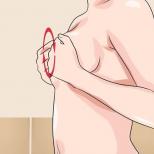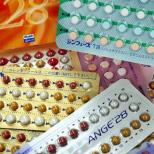Breast pain during ovulation
Cyclic mastodynia - this is the medical definition of soreness of the mammary glands during ovulation. Pain manifests itself to one degree or another, depending on the individual characteristics of the female body. For some, a slight painful sensation is characteristic, which causes a minimum of discomfort, for others, on the contrary, the painful syndrome covers the entire chest, up to swelling and the inability to even touch the mammary gland. As a result, vital activity decreases, mood deteriorates significantly. However, experts define this condition as the norm.
| Symptom | a brief description of |
|---|---|
| Changing Selections | Typical vaginal discharge is replaced by more abundant, and reminiscent of raw protein. The discharge has a creamy appearance if ovulation has not occurred |
| Increased libido | Since the female body is fully prepared for conception, there will be a high level of sexual desire, which will subside after ovulation is completed. |
| Elevated basal body temperature | A slight increase in basal temperature indicates an increase in progesterone levels |
| Change in the cervix | On palpation, it can be established that the cervix is slightly elevated, open and softer. As a result, the secreted mucus has an altered consistency. |
| Pain in the chest | One of the typical signs of ovulation is breast tenderness. Due to hormonal surges, the breasts become very sensitive. |
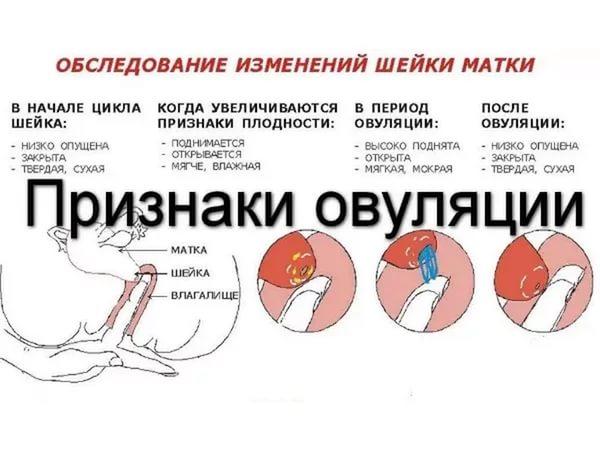
It is important! The above signs are generally accepted, but may vary depending on the female body.
Causes of breast pain
To get an understanding of why there is pain in the mammary gland before, after, or during ovulation, one should consider the entire physiological process that occurs at this time in the female body.
Approximately in the middle of the menstrual cycle, the rupture of the formed follicle falls. As a result, there is a significant increase in the level of progesterone in the blood. As a result, the mammary gland responds to a hormonal surge. Thus, the body prepares for a possible future pregnancy. When a woman plans to become a mother, the glandular tissue begins to increase rapidly. Sometimes such preparation of the body can occur before the onset of menstruation, when a fertilized egg is expected to enter the uterine cavity. The breast swells, painful sensations arise - these are signs typical of the female body during the period of ovulation.
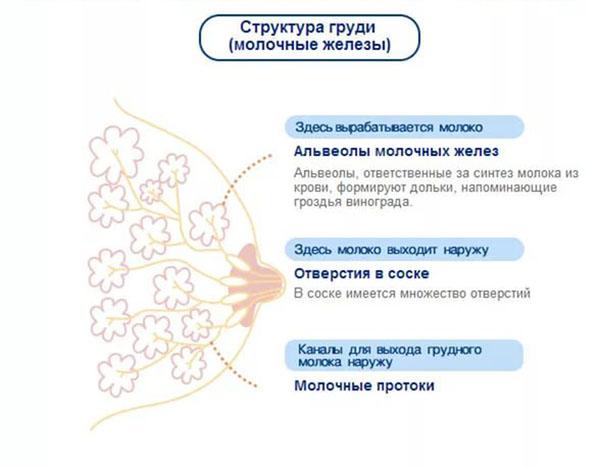
The appearance of pain is explained by the fact that the mammary gland consists of connective tissue, which does not have the ability to stretch, therefore, with an increase, this occurs due to the growth of glandular tissue.
Reference! During ovulation, the nerve endings are affected, which are compressed. In parallel, the sensitivity of the nipples increases.
After some time, the area of the nipples and halos is also subject to painful sensations. However, when the day of ovulation arrives, the level of progesterone normalizes, the mammary glands acquire their former forms.
Pain before and after ovulation
It is worth noting an important fact, if a woman’s chest does not stop hurting after the end of ovulation, then there is a high probability that pregnancy has occurred. To confirm or exclude it, it is recommended to urgently take a pregnancy test. However, one must not forget to pay attention to all sorts of atypical symptoms that can warn of an ectopic conception, which is dangerous for women's health. Therefore, it is best to visit a doctor and undergo a mandatory ultrasound examination to exclude pathology.
If asymptomatic pain appears long before ovulation and the onset of menstruation, it is necessary to independently examine the breast for the presence of neoplasms, and then go to an appointment with a mammologist. To exclude all kinds of cysts and other neoplasms, a number of diagnostic studies (blood test, MRI, ultrasound, mammogram) are recommended for a woman.
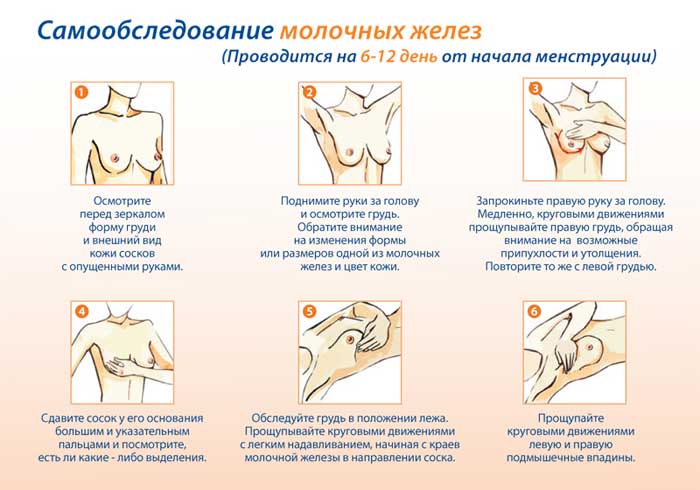
If, before the start of menstruation, a woman has pain in both mammary glands, including nipples and halos (pain is continuous), then it is important to establish at what level the hormonal background is, perhaps under the influence of any factors, an increase in male or female hormones has occurred . These failures occur for the following reasons:
- unhealthy diet and unhealthy lifestyle;
- the presence of STDs;
- ectopic conception;
- adhesions in the ducts (very often observed in young girls who have not given birth).
Carefully! If the pathological process that develops against the background of a hormonal disorder is not identified and eliminated in a timely manner, then the woman is threatened with the occurrence of diffuse cystic mastopathy. Medicine defines it as a benign neoplasm, but the risk of degeneration into a tumor is not excluded. As the neoplasm grows, soreness can increase significantly.
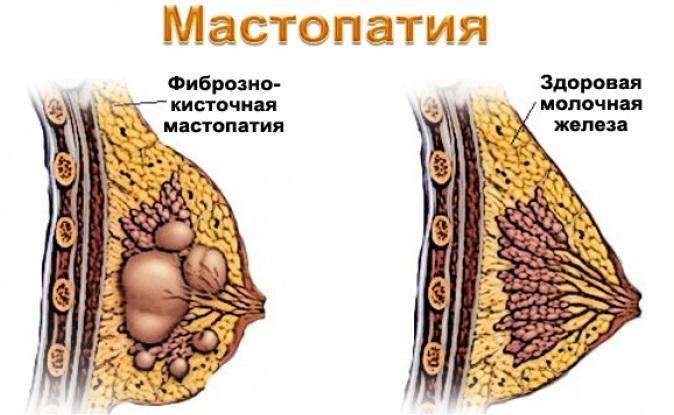
When will the pain go away?
If the pain is pronounced and causes discomfort, then the woman is most interested in the question, when will the pain stop? How many days before and after ovulation chest pain will last is very individual.
Women try to track the day of ovulation, and note that already three days before its onset, there are discomfort in the chest, the nipples become sensitive. The feeling of aching pain can persist on the third day. Such sensations are quite normal, since there is a process of rejection of the unnecessary endometrium with the release of an unfertilized egg. When discomfort persists exclusively on the sides of the mammary glands, then this is evidence of the completion of the egg's journey.
Note! Not a single gynecologist can accurately answer the question of why the chest hurts or does not hurt during ovulation, since these processes are the norm, which depends on the individual characteristics of the body of each woman.
Video - What to do with chest pain
Is breast tenderness during ovulation always normal?
The pain syndrome can drag on for a week after ovulation. Do not worry if prolonged pain dragged on in only one menstrual cycle. When the pain has a constant cyclical nature, then you should think about a visit to a gynecologist and mammologist.
It is very important to monitor the condition of the mammary glands after menstruation, since during this period they are in complete calm and no discomfort should disturb the woman. On the contrary, if there is pain in one mammary gland or in both, then an urgent examination is indicated.
It is important! To the extent of the fear of detecting oncological formations in the breast, most women delay the visit to the mammologist. Such inaction can only do harm, since in most cases a benign neoplasm under the influence of a hormonal background can degenerate into a malignant tumor. In this case, it will not be possible to prevent serious consequences.
A certain hormone, estrogen, affects the compaction, swelling, enlargement, engorgement or swelling of the breast. Its excess causes pathological processes in the chest. As a result, cystic formations develop in the mammary glands.
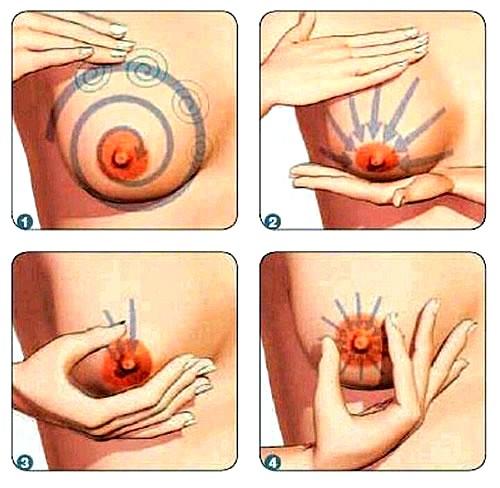
Soreness and discharge in the chest during the ovulatory period
Normal indicators deny the presence of any discharge from the nipples, despite the fact that breast tenderness remains normal. A woman may find discharge in herself or their remnants on a bra (dark or milky in color). Such discharge may indicate an excess of prolactin. To establish an accurate clinical picture, it is necessary to consult a mammologist.
It does not matter on which day of the cycle the discharge from the milk ducts appeared. It is important to contact a specialist in a timely manner in order to normalize the level of prolactin, since it contributes to the development of cystic formations.
Reference! A cyst is a neoplasm that is characterized by a benign character, described as a bubble-like cavity with liquid contents.
It should also be noted that elevated levels of prolactin can contribute to the release of colostrum even in the absence of pregnancy. It is possible to exclude hyperprolacthymia through special drug treatment. However, before treatment is prescribed, the woman is recommended to examine the area of the pituitary gland (in the presence of a tumor, an increase in prolactin may be observed).
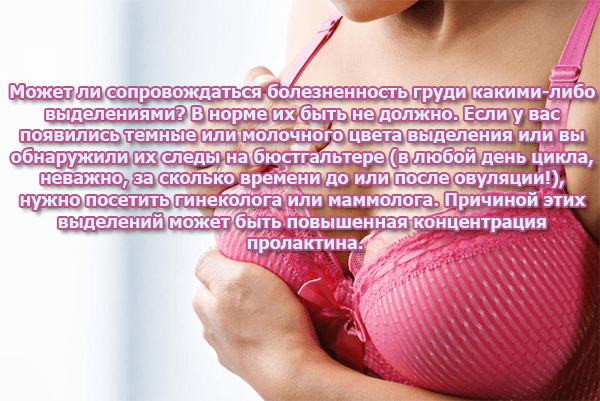
Before ovulation, a woman may experience vaginal discharge (pink, beige). This phenomenon is quite normal, since such discharges characterize the process of egg release.
0

